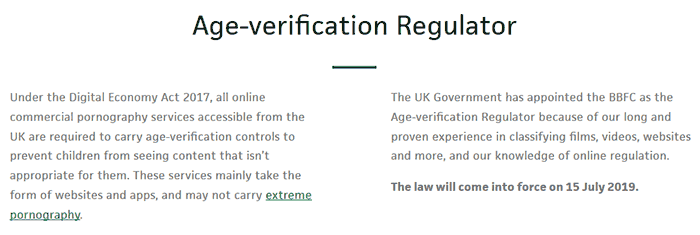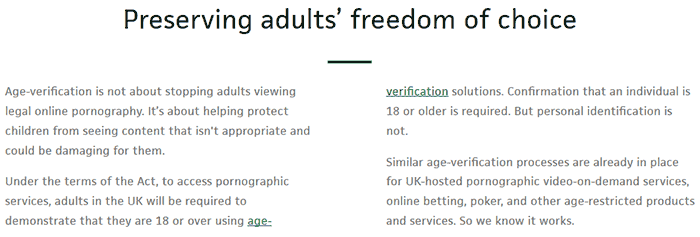The UK government has confirmed that its controversial age verification checks for online pornography access will become mandatory from 15th July. After that date we will become "the first country in the world," to implement such measures, boasts the Gov.UK website. Anticipating some kind of outcry, perhaps, it adds that "88 per cent of UK parents with children aged 7-17" back its age verification based censorship. The government's age verification system will block access to certain sites unless a user can certify that they are 18 or over.
Margot James, the government's Minister for Digital, supplied the following statement with regard to age verification:
"Adult content is currently far too easy for children to access online. The introduction of mandatory age-verification is a world-first, and we've taken the time to balance privacy concerns with the need to protect children from inappropriate content. We want the UK to be the safest place in the world to be online, and these new laws will help us achieve this."

The British Board of Film Classification (BBFC) will be responsible for ensuring compliance with the new laws. It will check pornographic sites, and those with more than a third of their content falling under the pornographic genre, and ensure they become part of the age verification scheme or face having their site blocked by UK ISPs. A previously touted system of fines rising to £250,000 for refusing to carry out age checks has been abandoned as it has been judged the threat of UK blocking, and potential withdrawal of payment services, will be sufficient.
There are already those anticipating teens, for example, finding loopholes in the age verification system. For example VPNs could be used, and sites with more than two thirds of their content classified as not-pornography-based will sidestep the requirement for verifications. Thus many users will still be able to view porn via sites like Twitter, Reddit or Imgur. In response to this the government admits its solution isn't a silver bullet but will mean less people, especially children, inadvertently stumble across adult content online.

Privacy campaigners are being reassured that the voluntary certification scheme is being designed with a view of "verifying age, not identity". Age verification providers will have to comply with General Data Protection Regulation (GDPR) standards. Furthermore, the Age-verification Certificate (AVC) voluntary scheme created by the BBFC will make sure providers pass further data security standards. Such age verification providers will be able to display the BBFC's green AV symbol. Details will be shared on the BBFC's age-verification website, ageverificationregulator.com.














